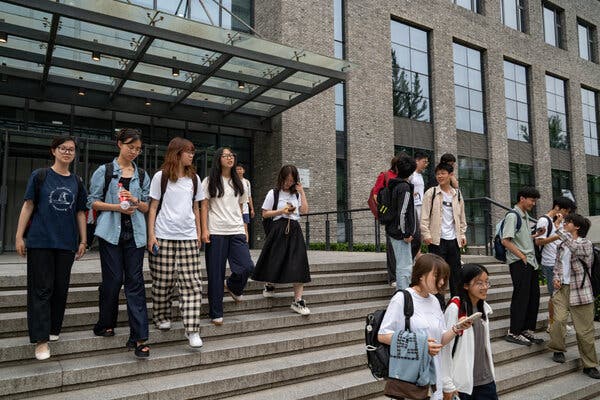The Chinese government recently introduced a new visa aimed at attracting foreign science and technology talent, positioning it as a vital step towards establishing China as a global scientific leader. However, the move has sparked significant backlash among the Chinese public, who express concerns that foreign professionals may take job opportunities from local graduates at a time when youth unemployment is on the rise.
On October 1, 2023, the visa was set to come into effect, but social media platforms quickly filled with criticism. Many commenters accused the government of inviting foreigners to “steal jobs” during a period when young Chinese are struggling to secure employment. Nationalistic sentiments surfaced, with some influential figures warning that an influx of foreigners could overwhelm local job seekers. This sentiment was amplified after Henry Huiyao Wang, president of the Center for China and Globalization, praised the initiative, leading to accusations of him being a “race traitor” among netizens.
The reaction intensified particularly towards Indian nationals, spurred by reports from Indian media suggesting the new visa might serve as an alternative to the increasingly costly H-1B visa in the United States, which now incurs a fee of $100,000. In response to the heightened criticism, the People’s Daily, an official state publication, labeled the backlash as “outlandish” and accused detractors of misleading the public.
Despite these defenses, the public outcry highlights the challenges China may face in attracting top-tier international scientists, especially as the United States has cut research funding, prompting some scholars to consider relocating abroad. Anti-foreign sentiment has grown in recent years, fueled by government warnings about “hostile overseas powers” and calls for vigilance against potential espionage.
China has historically maintained low levels of inbound immigration, and numerous cultural and legal barriers still exist for foreigners wishing to reside long-term. In 2020, the government attempted to ease permanent residency requirements but retreated after facing similar backlash. According to the People’s Daily, fewer than 5,000 permanent residency cards were granted between 2004 and 2014.
The specifics of the new visa, including whether it provides the right to work or merely facilitates educational exchanges, remain vague. Officials have stated that applicants must hold at least a bachelor’s degree in science, technology, engineering, or mathematics from a reputable university, but other eligibility details are still pending.
Youth unemployment in China has reached alarming levels, with recent figures indicating it has hit a new high. Xi Jinping, China’s leader, has emphasized that job creation is essential for maintaining social stability. A popular manga author, who goes by the pen name Feng Xi Shen Lei, expressed the frustrations of many, stating, “Given the talent pool in China, I don’t believe that there’s any position in any field that must be filled by a foreigner.”
Critics have also expressed discontent with the requirement that applicants need only a bachelor’s degree, arguing that many young Chinese professionals must pursue advanced degrees to remain competitive in the job market. The reality is that foreign applicants may not directly compete with many unemployed young Chinese, primarily due to a mismatch between job demand and supply within China’s economy.
Certain sectors, such as advanced manufacturing and artificial intelligence, require a significantly larger pool of qualified candidates than currently exists, according to the Ministry of Education. Although China produces the highest number of science and technology graduates globally, these graduates represent a smaller percentage of the total workforce compared to many Western nations.
Former executive vice chancellor of Duke Kunshan University, Denis Simon, noted that increased transparency regarding the visa application process could alleviate public concerns. He emphasized that Beijing is signaling its intention to attract more foreign expertise, stating, “This is part of the longer-term reforms needed to attract high-end talent.”
As China navigates these complex sentiments, the outcome of the visa initiative remains uncertain, with the potential for significant implications for both domestic job seekers and the global scientific community.
